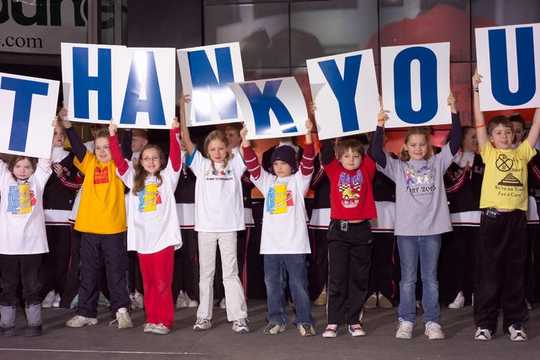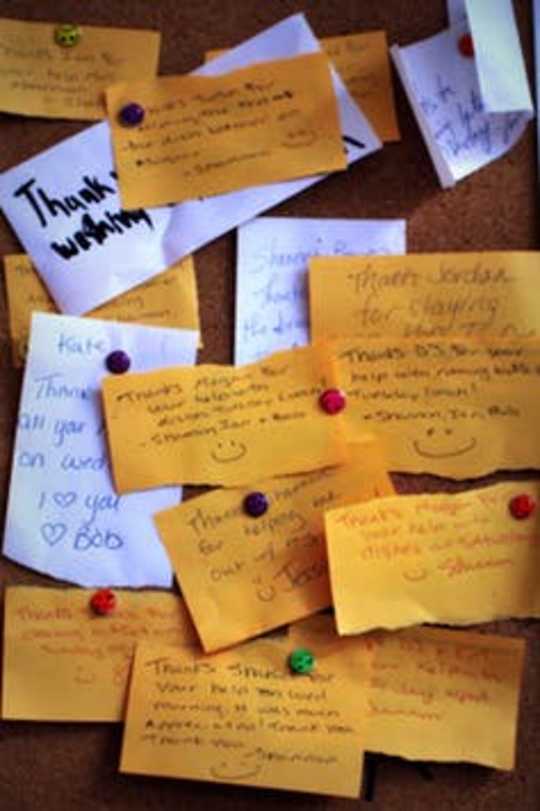 Two little words can say so much. Flickr/Ilya Lee, CC BY-ND
Two little words can say so much. Flickr/Ilya Lee, CC BY-ND
Most of us were taught that saying “thank you” is simply the polite thing to do. But recent research in social psychology suggests that saying “thank you” goes beyond good manners – it also serves to build and maintain social relationships.
This premise has its base in the find-remind-and-bind theory of gratitude, proposed by US psychologist Sara Algoe, from the University of North Carolina. According to this theory, gratitude prompts:
- the initiation of new social relationships (a find function)
- orients people to existing social relationships (a remind function)
- promotes maintenance of and investment in these relationships (a bind function)
As with all emotions, gratitude can be both felt and expressed. The evidence on how feeling gratitude functions to find, remind, and bind in social relationships is robust. From promoting helping and trust to lowering aggression, feeling grateful gives rise to a wide range of outcomes that benefit both parties in a social relationship.
Turning to expressing gratitude, the existing work is relatively sparse. The evidence that does exist largely focuses on ongoing social relationships, such as those between romantic partners.
When we say ‘thank you’
It only takes a moment of reflection to realise that expressions of gratitude are not solely relegated to such ongoing social relationships.
 Saying “thank you” to strangers. Flickr/worldoflard , CC BY-NC
Saying “thank you” to strangers. Flickr/worldoflard , CC BY-NC
When a stranger holds a door, when a barista hands over the morning espresso or when we step off the bus, we typically (or should!) say “thank you”.
The question becomes: how do these expressions of gratitude among strangers shape social relations? Might hearing “thank you” help us “find” new social relationships?
So my colleague Monica Y Bartlett, from Gonzaga University in Washington, US, and I carried out the first empirical test of the “find” function of expressing gratitude among strangers, with the results published this month in the journal Emotion.
In the study, we sought to create a situation in the lab where we could manipulate the expression of gratitude in a realistic way. So we asked our 70 undergraduate participants to help pilot a new mentoring program supposedly run by the university.
As part of the pilot, all of our participants were to act as mentors by giving advice on a writing sample from a high-school student mentee. The writing sample was one that the mentee planned to use in their university admissions package.
This setup ensured that we satisfied one of the core starting points of gratitude – the granting of help, resources or a favour.
A week later, we brought the participants back to the lab. All participants received a note purportedly written by the high school mentee. For half of the participants – those in the control condition - this note simply acknowledged the advice.
I received your feedback through the editing program. I hope to use the paper for my college applications.
Here comes the manipulation of gratitude expression. Critically, for the other half of the participants, the note also included an expression of gratitude.
Thank you SO much for all the time and effort you put into doing that for me!
This design meant that all participants received a note – just the content of the note differed across conditions.
Participants next completed a series of questionnaires assessing their impressions of the mentee, and then were informed that the study was complete.
Except, that wasn’t quite true. The researcher casually mentioned that the pilot program organisers had left a set of notecards for mentors to complete if they chose to. The program organisers would ensure that the mentee received the note if the mentee were accepted to the university.
The researcher made it clear that leaving a note was completely optional and then left the room. Participants were thus left alone to decide whether to write a note, and, if so, what to say.
This note-writing opportunity served as our dependent measure of actual social affiliation. Would participants take the opportunity to establish a social relationship with their mentee? Would this depend on whether the mentee had expressed gratitude?
How far does gratitude go?
Perhaps not surprisingly, all but three participants wrote a welcome note (university students are, after all, a pretty kind bunch). Promisingly for the “find” hypothesis, all three participants who didn’t leave a note were in the control condition.
 More than just a note - saying “thank you” makes a difference. Flickr/Morgan, CC BY
More than just a note - saying “thank you” makes a difference. Flickr/Morgan, CC BY
To test the “find” hypothesis more directly, we coded what participants wrote in those notes and a pattern quickly became clear.
Of the participants who had received a note expressing gratitude from their mentee, 68% left their contact details in their note. Only 42% of those who had received the control note left any contact details. The difference was statistically significant.
Next we tested what might explain this difference. For this, we looked to how participants rated their mentees. Specifically, we considered two dimensions – interpersonal warmth (kindness and friendliness) and competence (skill and intelligence).
We reasoned that if gratitude expressions function to service social relationships, the effect should be better explained by warmth than by competence.
Sure enough, mentees were perceived as more interpersonally warm when they had expressed gratitude. Further, this increase in perceived interpersonal warmth explained the increase in likelihood of leaving contact information for the gratitude-expressing mentees. This wasn’t the case for competence.
The takeaway message
Saying “thank you” goes beyond good manners. At the end of the day, initiating a social bond can be risky. We need to be selective and choose to invest in those bonds with the highest likelihood of being a good investment. In this context, an expression of gratitude serves as a signal that the expresser is a good candidate for a future social relationship.
Expanding the premise a bit further, perhaps the gratitude challenges that have swept social media (in their 7, 10, 21, 100, or 365 day forms) might have downstream benefit.
{vembed Y=OHxlXLDMG0Q}
In these challenges, a person posts verbal statements or photographs of things for which they are grateful on a daily basis via Facebook, Instagram, Blog, or Twitter – in essence, a very public and ongoing gratitude journal.
There’s little doubt this has a positive effect on the social relationships directly implicated in these expressions (between romantic partners, family members, and friends), though some find it annoying and question whether it’s sustainable. Our findings suggest that undertaking such gratitude challenges might have an effect on how even strangers come to see us.
While many questions remain for future research, our research provides initial evidence for the power of saying “thank you” to strangers. Something to keep in mind the next time you pick up your dry cleaning or are given a seat on the train.![]()
About the Author
Lisa A Williams, Lecturer, School of Psychology, UNSW
This article is republished from The Conversation under a Creative Commons license. Read the original article.

Related Books:
The Four Agreements: A Practical Guide to Personal Freedom (A Toltec Wisdom Book)
by Don Miguel Ruiz
This book offers a guide to personal freedom and happiness, drawing on ancient Toltec wisdom and spiritual principles.
Click for more info or to order
The Untethered Soul: The Journey Beyond Yourself
by Michael A. Singer
This book offers a guide to spiritual growth and happiness, drawing on mindfulness practices and insights from Eastern and Western spiritual traditions.
Click for more info or to order
The Gifts of Imperfection: Let Go of Who You Think You're Supposed to Be and Embrace Who You Are
by Brené Brown
This book offers a guide to self-acceptance and happiness, drawing on personal experiences, research, and insights from social psychology and spirituality.
Click for more info or to order
The Subtle Art of Not Giving a F*ck: A Counterintuitive Approach to Living a Good Life
by Mark Manson
This book offers a refreshing and humorous approach to happiness, emphasizing the importance of accepting and embracing life's inevitable challenges and uncertainties.
Click for more info or to order
The Happiness Advantage: How a Positive Brain Fuels Success in Work and Life
by Shawn Achor
This book offers a guide to happiness and success, drawing on scientific research and practical strategies for cultivating a positive mindset and behavior.



























